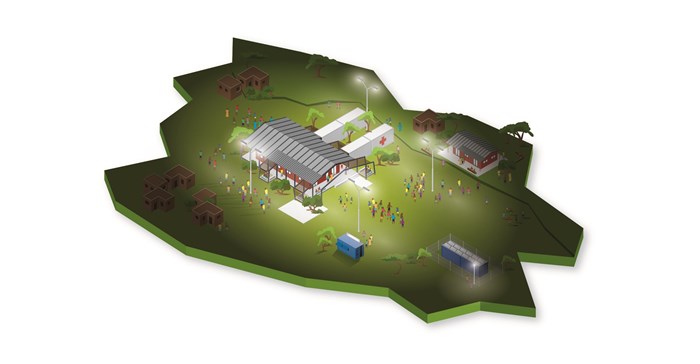
North-Eastern Kenya has one of the world’s highest maternal mortality ratio - 3,795 per 100,000 live births. The project, which is supported by the County Government of Mandera, is the second of its kind in the world. Philips inaugurated the first CLC in Kiambu County, Kenya in 2014.
The CLC will deliver crucial primary healthcare and enhance community development in Mandera. The first phase of the project is expected to be completed this year.
The issues facing primary healthcare in Africa are complicated and multifaceted therefore, to create sustainable improvement means addressing a wide range of issues collectively. Issues range from unavailability of qualified healthcare workers to lack of electricity, water and basic healthcare technology.
The creation of the CLC concept enabled Philips to realise its vision to drastically improve primary healthcare in Africa by addressing all causes in one solution.
Developed by the Philips Africa Innovation Hub, the concept of the CLC is a community driven and integrated approach for strengthening primary healthcare and service facilities that provide community development from a healthcare, lighting and healthy living perspective.
The CLC concept goes beyond healthcare by turning a health facility into a community hub where technology is bundled with an integrated service package and community empowerment interventions. The technology includes solar power (for reliable and clean energy supply), efficient and durable indoor and outdoor LED-lighting (enabling extended opening hours and providing security to patients and staff), healthcare equipment (to enable patient monitoring, diagnosis and triage), laboratory equipment (especially for antenatal care tests), refrigeration (preserving the life span of vaccines), IT-solutions (storage of patient data), water supply and purification (preventing waterborne diseases) and promotion of community entrepreneurism and social enterprise (utilizing new opportunities created by 24/7 lightning, energy and water).
Siddharth Chatterjee, the UNFPA representative to Kenya said, “Our collaboration with Philips on the CLC is a welcome first step. Our collaboration will be more meaningful when we have demonstrated significant improvements in the health outcomes of the 15 counties in Kenya that suffer from the highest burden of maternal and newborn mortality. We aim to improve these outcomes by transforming their primary healthcare systems. Key elements for the success of our CLC collaboration are innovation, adaptability, scale and sustainability.”
UNFPA has spearheaded the 'Every Woman Every Child (EWEC) Private Sector Collective Action' initiative in Kenya, of which Philips is a founding member. This ground-breaking initiative aims to significantly advance maternal new-born health outcomes in six counties in Kenya, which contribute close to 50% of all maternal deaths in the country. The CLC in Mandera reflects the EWEC commitment.
In June 2014, Philips inaugurated the world’s first CLC in Kiambu, Kenya (located at the Githurai Lang’ata Health Centre in Kiambu County). The development in Kiambu saw Philips transform a rundown healthcare centre into a bustling community hub where families gather, children do their homework (under solar powered lights), commercial activities take place, and where local Government representatives raise awareness and inform locals about relevant health issues.
“In support of our EWEC commitment, the CLC in Mandera, will bring quality primary healthcare to a catchment population of about 40,000 women and children,” said JJ van Dongen, CEO Philips Africa.
“At Philips, our mission is to improve people’s lives through meaningful innovation - the CLC demonstrates an integrated model of healthcare that conjoins technology with services and aims to inspire an entire community to change the way it sees and looks after itself. That’s precisely the kind of innovation that can revolutionise society.”
In Mandera, health workers, community members and other key stakeholders are involved in the entire development process. The CLC will utilise modern healthcare technology and over time is expected to migrate from manual to automated processes and systems, which will be connected to the appropriate Philips local service support organisation.
Local health workers and community members will be trained and adequately skilled in using this technology, and in turn this will create new education and employment opportunities at local level, thereby improving the livelihood of the community and supporting the sustainability of the CLC.
Ahmed Sheikh, CEC Health, Mandera County said, “We are delighted that Philips and UNFPA have collaborated to develop a CLC in Mandera. This news comes at a time when our region needs it most. This collaboration will have far reaching benefits, and we expect it will enrich the community in Mandera for years to come.”
Philips is rolling out the CLC solution in collaboration with organisations like UNFPA and governments that want to strengthen their community and primary healthcare systems, improving both preventive and curative healthcare as well as social and economic development

APO is the sole press release wire in Africa, and the global leader in media relations related to Africa. With headquarters in Dakar, Senegal, APO owns a media database of over 150,000 contacts and the main Africa-related news online community.
Go to: www.bizcommunity.com/PressOffice.aspx?cn=apogroup